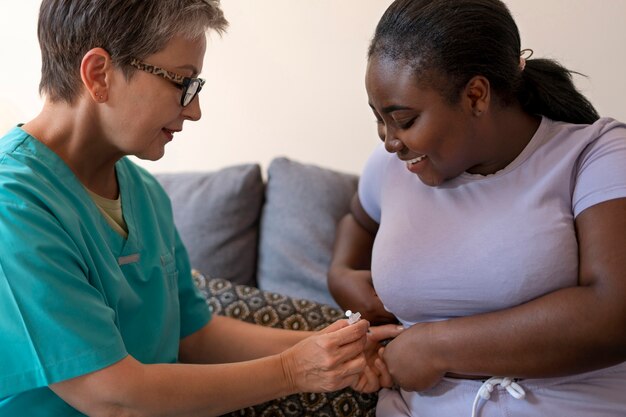
Colorectal cancer is one of the most common, yet preventable, cancers—but it doesn’t impact everyone equally. While there’s been progress in reducing cases and deaths among older adults, Black individuals still face a significantly higher risk. According to the American Cancer Society, Black Americans are 20% more likely to develop colorectal cancer and 40% more likely to die from it than their White counterparts. In fact, of all ethnic groups, Black people tend to have the highest death rates and shortest survival times for most types of cancer.
The untimely passing of actor Chadwick Boseman at age 43 in 2020 brought attention to the troubling rise in colorectal cancer among young adults, particularly among Black men and women. Let’s take a closer look at what colorectal cancer is, why it disproportionately affects Black individuals, and the actions you can take to protect yourself.
### Understanding Colorectal Cancer
Colorectal cancer affects the colon or rectum, which are parts of the large intestine. Sometimes referred to as colon cancer or rectal cancer depending on the location, it typically begins as a polyp—an abnormal growth of tissue inside the colon or rectum. While not all polyps turn into cancer, some can develop into malignancies over time.
### Why Are Black People at Greater Risk?
The increased risk for Black individuals stems from a combination of factors. Awareness, access to quality health care, and the ability to get timely screenings all play a role in this disparity. Additionally, colorectal cancer in Black men and women often develops on the right side of the colon. Research shows that right-sided colorectal cancers tend to be more aggressive and harder to diagnose compared to those on the left side, which are more common in individuals of European descent and typically easier to detect and treat in earlier stages.
Colorectal cancers on the right side of the colon often progress further before they’re diagnosed. Because of this, Black individuals frequently face more advanced disease and worse outcomes than those whose cancers are detected on the left side.
### Why Early Detection and Access Matter
Access to colorectal cancer education and screenings can significantly reduce racial disparities in diagnosis and treatment. Early detection leads to better outcomes, so ensuring that everyone—especially high-risk individuals—has access to recommended screenings is crucial.
There are several common methods for colorectal cancer screening:
– **Colonoscopy**: This is the gold standard for screenings. A colonoscope, which is a flexible, lighted tube with a camera, allows doctors to examine the rectum and entire colon, and even remove tissue for testing if needed.
– **Virtual colonoscopy**: A CT scan is used to create 3D images of the colon and rectum from outside the body.
– **Stool-based tests**: These tests detect blood or DNA in the stool, which could indicate colorectal cancer. Options include:
– **Stool DNA tests**: These combine DNA analysis with a fecal immunochemical test (FIT) for improved accuracy.
– **Fecal immunochemical test (FIT)**: This identifies specific proteins found in blood and can detect hidden blood in the stool.
Screenings are often covered by Medicaid, Medicare, and private insurance plans as part of preventive care. Free or low-cost screenings may also be available; programs like Stop Colon Cancer Now can help you find affordable options.
### Steps to Reduce Your Risk
If you are Black, don’t put off learning about your risk factors. Talk to your doctor about your family history, lifestyle, and when you should begin screenings. For individuals at an average risk of colorectal cancer, screenings should start at age 45. However, if you have an immediate family member diagnosed with colorectal cancer before age 45, a colonoscopy should be done 10 years earlier than their age at diagnosis.
Here are some practical steps you can take to lower your risk of developing colorectal cancer:
1. **Focus on a healthy diet**: Eat more fruits, vegetables, whole grains, and lean proteins. Minimize your intake of red meat and processed meats like bacon or sausage, as they are linked to higher cancer risk.
2. **Stay active**: Aim for at least 150 minutes of moderate exercise or 75 minutes of vigorous exercise each week.
3. **Maintain a healthy weight**: Excess weight is a known risk factor for colorectal cancer, so prioritize balanced eating and physical activity.
4. **Limit alcohol consumption**: Avoiding alcohol completely is best for cancer prevention, but if you drink, stick to moderation—up to one drink per day for women and two for men.
5. **Quit smoking**: Smoking increases the risk of colorectal and many other cancers, so quitting is one of the best things you can do for your overall health.
### The Big Picture
Significant progress has been made in treating colorectal cancer, but addressing ongoing racial disparities is essential—especially in Black communities. By understanding the specific risks and challenges faced by certain groups and taking proactive steps, we can work toward a future with fewer cases and better outcomes for everyone.
For personalized advice, talk to your doctor or a specialist to assess your risk and discuss when to start getting screened. Taking these steps can make a big difference in catching the disease early—or even preventing it entirely.